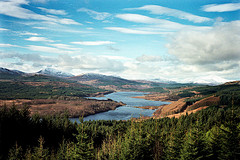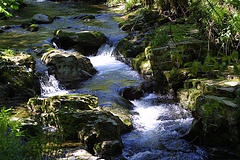1.1. Paco hasn't been losing his time
1. Paco (read) leaflets about the Scottish Highlands on the train.
2. For centuries, the inhabitants of Scotland (build) castles and fortifications of different kinds.
3. Paco (look) through the window all the way from Edinburgh.
NEGATIVE
1. Paco ________________________________________ leaflets about the Scottish Highlands on the train.
2. For centuries, the inhabitants of Scotland _______________________________________ castles and fortifications of different kinds.
3. Paco ___________________________________________ through the window all the way from Edinburgh.
INTERROGATIVE
1. ________________________________________________________ leaflets about the Scottish Highlands on the train?
2. ________________________________________________________ castles and fortifications of different kinds for centuries?
3. ________________________________________________________ through the window all the way from Edinburgh?
When we pronounce have or has in isolation, it is pronounced /hæv/ and /hæz/. However, when it is pronounced in sentences such as with the Present Perfect (as auxiliaries), the vowel must be pronounced in a week form, that is, /həv/ and /həz/. You can hardly hear the vowel sound.
Listen to the following sentences, paying attention to the pronunciation of have and has.
1. Paco has been reading leaflets about the Scottish Highlands on the train.
2. For centuries, the inhabitants of Scotland have been building castles and fortifications of different kinds.
3. Paco has been looking through the window all the way from Edinburgh.
Now it's your turn to practice. Listen to them and repeat them several times until you feel confident. Then record them on the forum.
 |
| By steveyb, C. Commons |
Lochs and glens
Loch is the word Scottish people use for lake as well as glen is the word for valley. The words come from Gaelic and they are applied to most lakes and valleys in Scotland.
The most famous Scottish loch (pronounced /lɒx/ by Scottish people or /lɒk/ by other people) is Loch Ness but there are many more such as Loch Lomond, Loch Morar, Loch Awe or Loch Lochy, which are the largest and deepest lochs in Scotland.
A glen is a valley, usually long and deep and often with a watercourse running through it. Some of the most popular ones are Glen Clova, Glen Dochart, Glen Garry or Glen Orchy.
This region of Scotland offers a beautiful scenery of mountains, lochs and glens, together with a spectacular wildlife and natural fauna. Some of the rarest species found here are the Red Deer, the Red Squirrel or the Golden Eagle.
 |
 |
| By Hermés, C. Commons |
By MarkAndMarina, C. Commons |